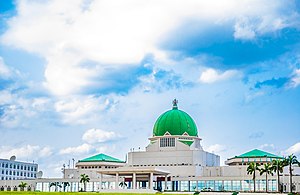
Back Abuja ACE Abuja Afrikaans አቡጃ Amharic Abuja AN Abūdga ANG أبوجا Arabic أبوجا ARY ابوجا ARZ Abuya AST Abuja AVK
| Year dem found am | 1828 |
|---|---|
| Official name | Abuja |
| Native label | Abuja |
| Demonym | Abujanais, Abujanaise |
| Country | Nigeria |
| Capital of | Nigeria, Federal Capital Territory (Nigeria), Abuja Municipal |
| Edey de administrative territorial entity insyd | Federal Capital Territory (Nigeria) |
| Located in time zone | UTC+01:00 |
| Coordinate location | 9°3′20″N 7°29′29″E |
| Member of | World Tourism Cities Federation |
| Twinned administrative body | Brasília |
| Dema official website | https://www.fcta.gov.ng/ |
| Time of earliest written record | 1700 |
| Category for the view of the item | Category:Views of Abuja |

Abuja (/əˈbuːdʒə/)[1] be de capital den eighth most populous city for Nigeria.[2] Edey de centre of de country wey dey within de Federal Capital Territory (FCT), dem plan go build de city mainly insyd de 1980s based on a master plan by International Planning Associates (IPA),[3][4] be consortium for three American planning den architecture firms wey dey make up of Wallace, Roberts, McHarg & Todd (WRMT – a group of architects) as demma lead, Archisystems International (subsidiary for de Howard Hughes Corporation), den Planning Research Corporation. De Central Business District for Abuja dem design am by Japanese architect Kenzo Tange.[5][6][7] Dem replace Lagos, de country ein most populous city, as de capital for 12 December 1991.[8][9]
Abuja ein geography dem define am by Aso Rock, a 400-metre (1,300 ft) monolith left by water erosion. De Presidential Complex, National Assembly,[10] Supreme Court den much of de city dem extend am go south for de rock. Zuma Rock, a 792-metre (2,598 ft) monolith, edey lie just north for de city wey dey de expressway to Kaduna.[11]
At de 2006 census, de city for Abuja gey a population of 776,298[12] den 179,674 households[13] wey dey make am one of demma ten most populous cities insyd Nigeria (placing eighth as of 2006). According to de United Nations, Abuja grow by 139.7% as edey between 2000 den 2010, wey edey make am de fastest growing city insyd de world.[14] As of 2015, de city dey experience an annual growth for de least 35%, retaining ein position as de fastest-growing city for de African continent den one of de fastest-growing insyd de world.[15][16] As of 2016, de metropolitan area for Abuja be estimate say at six million people, wey dey place am behind only Lagos as de most populous metro area insyd Nigeria.[17][18]
- ↑ "Define Abuja's at Dictionary.com". dictionary.com. Random House, Inc. Retrieved 14 April 2015.
- ↑ "Abuja | Geography, Development, & Population | Britannica". www.britannica.com. Retrieved 12 March 2022.
- ↑ Ogbuenyi, Nosike (3 February 2022). "Abuja at 46: The Dreams, Strides, Challenges". Premium Times Nigeria. Retrieved 7 November 2022.
- ↑ "The Nigeria Capital City – AMLSN National Conference". Archived from the original on 26 February 2022. Retrieved 7 November 2022.
- ↑ "Central area of New Federal Capital City of Nigeria". Tange Associates. Retrieved 19 February 2022.
- ↑ "Life of poverty in Abuja's wealth". news.bbc.co.uk. BBC News, Tuesday, 13 February 2007. 13 February 2007. Retrieved 10 August 2007.
- ↑ titel. "Build a house in Japan | Connect with Japanese Architects | titel". titel (タイテル). Retrieved 12 March 2022.
- ↑ Roman Adrian Cybriwsky, Capital Cities around the World: An Encyclopedia of Geography, History, and Culture, ABC-CLIO, USA, 2013, p. 2
- ↑ Alkasum, Abba (2012). ABUJA: The making of a capital city, 1976–2006.
- ↑ "National Assembly | Federal Republic of Nigeria". www.nassnig.org. Retrieved 30 May 2020.
- ↑ "Zuma Rock". Visit Nigeria Now. Archived from the original on 27 June 2022. Retrieved 4 January 2022.
- ↑ "Legal Notice on Publication of 2006 Census Final Results" (PDF). Policy and Legal Advocacy Centre. Archived from the original (PDF) on 19 March 2013. Retrieved 10 June 2012.
- ↑ Ogwueleka, Toochukwu Chibueze (1 August 2013). "Survey of household waste composition and quantities in Abuja, Nigeria". Resources, Conservation and Recycling. 77: 52–60. doi:10.1016/j.resconrec.2013.05.011. ISSN 0921-3449.
- ↑ "World's Fastest Growing Cities are in Asia and Africa". Euromonitor. 2 March 2010. Archived from the original on 17 November 2015. Retrieved 26 October 2015.
- ↑ "Top 5 Cities To Do Business in Nigeria. ABUJA Is 2nd". Abuja Facts. 22 April 2015. Archived from the original on 4 February 2016. Retrieved 26 October 2015.
- ↑ Aguochi, O.J.J (2004). Abuja: Birth of the colossus. Stirling Horden publishers.
- ↑ Jaiyeola, Andrews. "FCT Minister Harps on Development of Satellite Towns". Archived from the original on 6 August 2017. Retrieved 22 November 2016.
- ↑ "Abuja Nigeria". ftan.org.ng. Archived from the original on 8 August 2021. Retrieved 30 May 2020.
